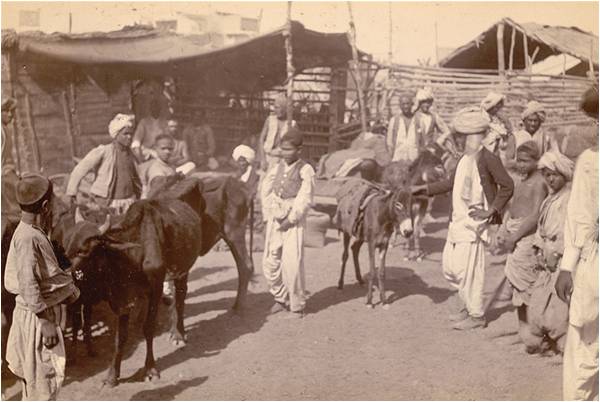
Photograph with a view taken in the Trans-Lyari Market, Karachi, taken by an unknown photographer around 1900, from an album of 46 prints titled ‘Karachi Views’.
Karachi, one of the world’s largest metropolises, was developed only in the mid-19th century. Its history prior to this is sketchy but it is believed to be the ancient port of Krokala on the Arabian Sea, visited by Alexander’s admirals in 326 BC.
Karachi is built around a bay which is a natural harbour and protected from storms by a group of small islands. The small fishing village became a trading port under the Kalhoras and the Talpur rulers of Sindh but the port (Kharak Bunder) remained small.
It was completely transformed when its harbour was developed by the British after they conquered Sindh in 1843. A city rapidly grew and the British undertook several improvements starting in 1854 so that the present port took shape.
At the end of the nineteenth century the Trans-Lyari Quarter of the city was made up of a cluster of poor settlements mostly consisting of reed and mud plastered huts with some more permanent dwellings. At this time one-quarter of the population of Karachi lived in this area across the Lyari River.
Karachi, one of the world’s largest metropolises, was developed only in the mid-19th century. Its history prior to this is sketchy but it is believed to be the ancient port of Krokala on the Arabian Sea, visited by Alexander’s admirals in 326 BC.
Karachi is built around a bay which is a natural harbour and protected from storms by a group of small islands. The small fishing village became a trading port under the Kalhoras and the Talpur rulers of Sindh but the port (Kharak Bunder) remained small.
It was completely transformed when its harbour was developed by the British after they conquered Sindh in 1843. A city rapidly grew and the British undertook several improvements starting in 1854 so that the present port took shape.
At the end of the nineteenth century the Trans-Lyari Quarter of the city was made up of a cluster of poor settlements mostly consisting of reed and mud plastered huts with some more permanent dwellings. At this time one-quarter of the population of Karachi lived in this area across the Lyari River.
– Courtesy British Library Online Gallery

